Your Trusted 24 Hours Business Service Provider !
Awarded as one of the top Japanese brands at the prestigious ‘Best Japan Brands’ for the 7th consecutive year, OMRON Corporation has stood tall in the industry for 91 years. Founded in 1933, OMRON presents an extensive product range that includes relays, switches, connectors, sensors, and many more. OMRON’s broad product offering solutions can be integrated in applications for energy, industrial automation, test and measurement/automated test equipment, power tools, smart home/building, and entertainment/gaming markets around the world.
OMRON electronic products are popular in many countries, including Singapore, for their quality and reliability. Whether you buy an OMRON sensor, a relay, or any other component, you can confidently integrate it into your project, knowing that it will last long, providing maximum efficiency.
As a Regional Authorized OMRON distributor, at Gennex, we offer a plethora of genuine products from OMRON relays and switches to connectors and sensors.
MOSFET Relays
When it comes to OMRON relays, A MOSFET relay is a non-contact relay used primarily for switching and connecting signals. It has mechanical relay and semiconductor features and is used in semiconductor inspection systems, various measurement devices, security equipment, and a wide range of other applications.


LINE UP
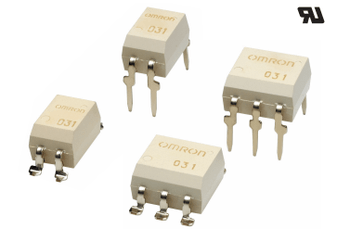
General Purpose Types
Best-selling products that can be used for various applications. Ideal for switching digital signals and analog signals

High Load Voltage Types
MOSFET relays that achieve high load voltage in SOP4 pin package
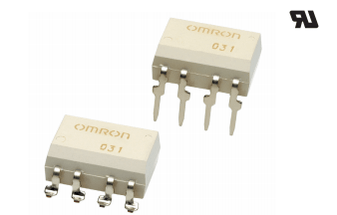
Multi Contact Pair Types (2a/2b/1a1b)
MOSFET relays with multi-pole contact configuration (2a/2b/1a1b) that can be used in various circuits
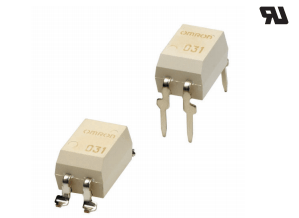
High Current Low on Resistance Types
MOSFET relays that realize low on-resistance and high-capacity switching comparable to mechanical relays
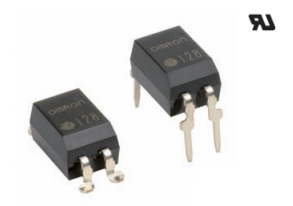
Small High Dielectric Strength Types
A withstand voltage of 5,000VAC between input and output in a small DIP4 pin package. High-sensitivity products are also available
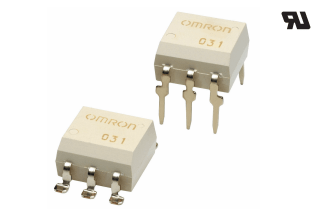
High Dielectric Strength Types
MOSFET relays with a withstand voltage of 5,000VAC between input and output made possible by a DIP6 pin package

Current Limiting Types
MOSFET relays with self-protection function (current limit) that is optimal for protection from overcurrent
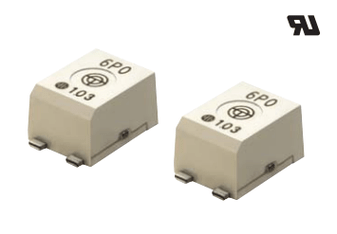
Low Capacity Between Terminals Low on Resistance Types
Ideal for semiconductor tester applications. Low CxR type that suppresses the product of C (capacity between output terminals) and R (output-on resistance). Lineup of models that give priority to low C and low R
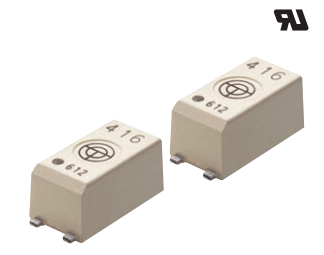
Small High Load Voltage Types
MOSFET relays that achieve high load voltage in a subminiature package

Small Size High Current Types
MOSFET relays that achieve high current in a subminiature package
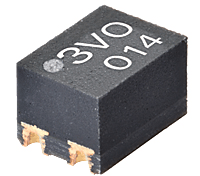
Voltage Driving Types
Voltage-driven MOSFET relays with a built-in current limiting resistor on the input side
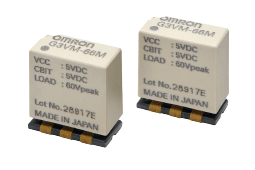
MOSFET Relay Module
MOSFET Relay in module package with SPDT(1C) and 1 pA max. leakage current
Applications:
- Semiconductor Inspection Devices
- Factory Automation
- Office Automation
- Alarm (Detector, Control Panel)
- Communication
Signal Relays
What is a Signal Relay?
OMRON’s Signal relay, another popular OMRON electronic product, is mainly used for lower than 2A load switching, and can be used in various applications such as telecom & network devices, test and measurement equipment, and security devices.
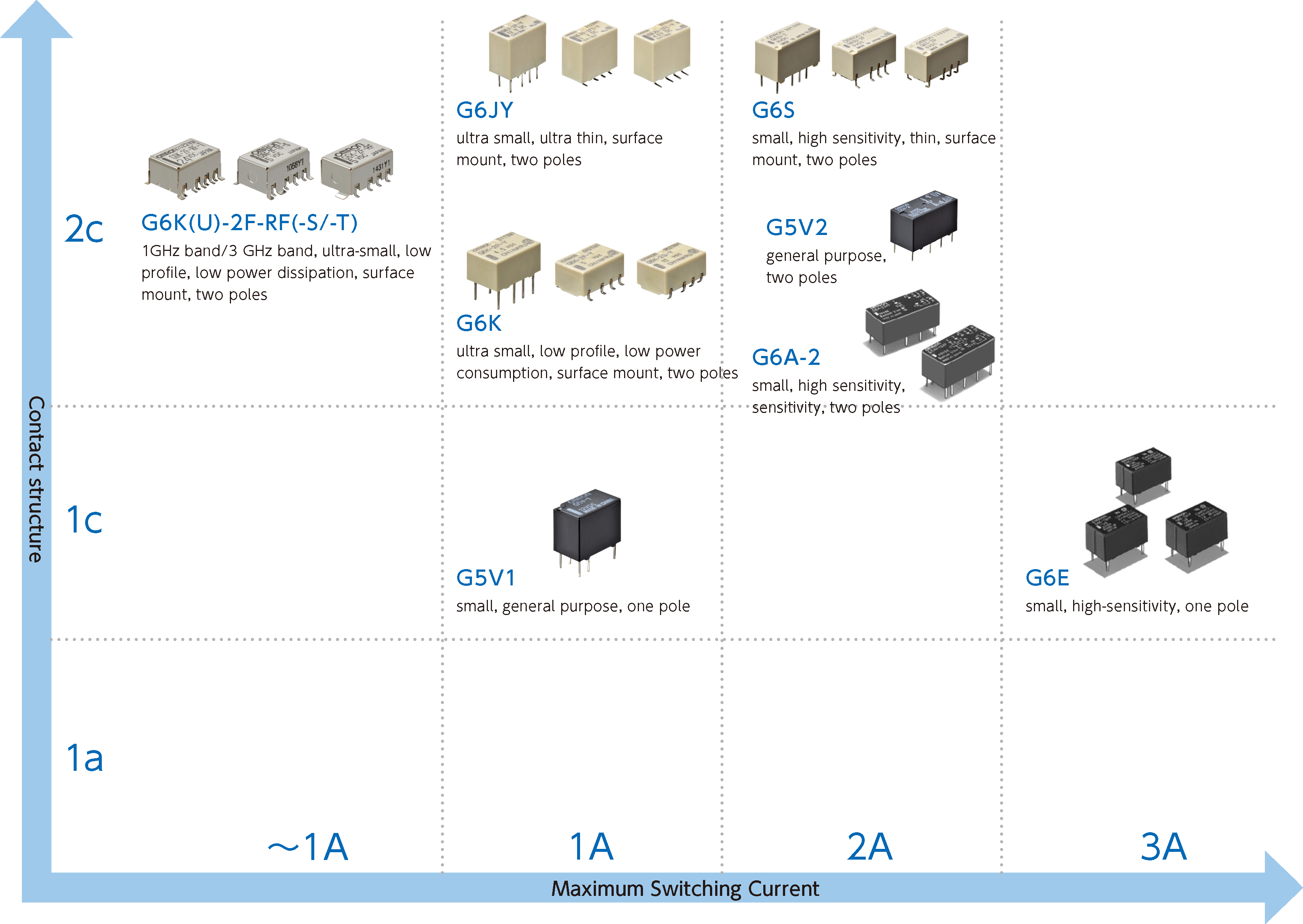
LINE UP
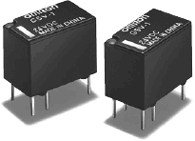
G5V-1
Ultra-miniature, Highly Sensitive SPDT Relay for Signal Circuits
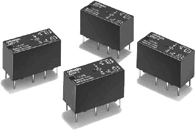
G5V-2
General-purpose, Low-cost, Two-pole Relays for Signal Circults
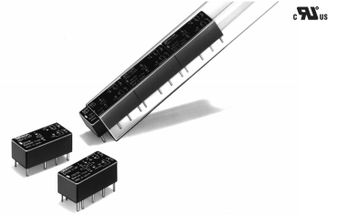
G6A
World's Standard Model G6A!
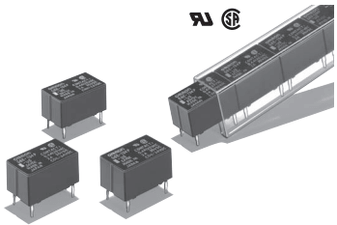
G6E
Subminiature, Sensitive SPDT Signal Switching Relay
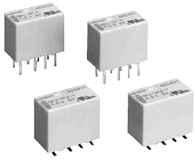
G6J-Y
Ultra-compact and Slim DPDT Relay
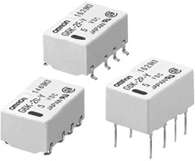
G6K
Surface Mounting Relay with the World’s Smallest Mounting Area
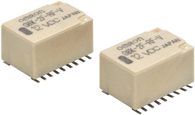
G6K(U)-2F(P)-RF(-S,-T)
Global standard automotive Plug-in Relays (ISO Relays)
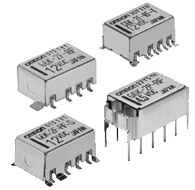
G6K-2F-RF-V
8-GHz Band Miniature DPDT High Frequency Relay for High-speed Differential Transmission Signal Switching
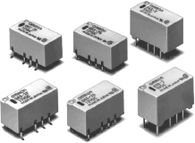
G6S
Compact, Industry-Standard 2-pole relay, designed to switch 2A Signal Loads.
Applications:
- Security devices: Gas Detectors, Disaster Prevention Devices, Alarms, Crime Prevention Equipment, Control Panels
- Testing and Measuring Devices: Oscilloscopes and Measuring Devices, IC testers, and ATE (Semiconductor Test Equipment)
- Industrial Devices: Machine Tools, Molding Machines, Welding Machines, Mounters, and other Industrial Robots
- Amusement Equipment: Gaming Machine and Peripherals
Power Relays
What is a PCB Power Relay?
OMRON PCB Power relays are mainly used for more than 3A load switches, and equipped in household appliances such as refrigerators, washing machines, AV devices, various FA equipment, industrial equipment, and household equipment. Power relays for printed circuit boards offer superior performance in high-capacity load switching in the power supply system owing to its material that can resist to contact arc and single contact structure. These power relays also retain excellent performance.
What is a DC Power Relay?
This is an OMRON relay that performs high-voltage and high-capacity urgent shutdown of DC circuits.
These relays not only energize the DC circuit but also shut down the high voltage circuit at high speed.
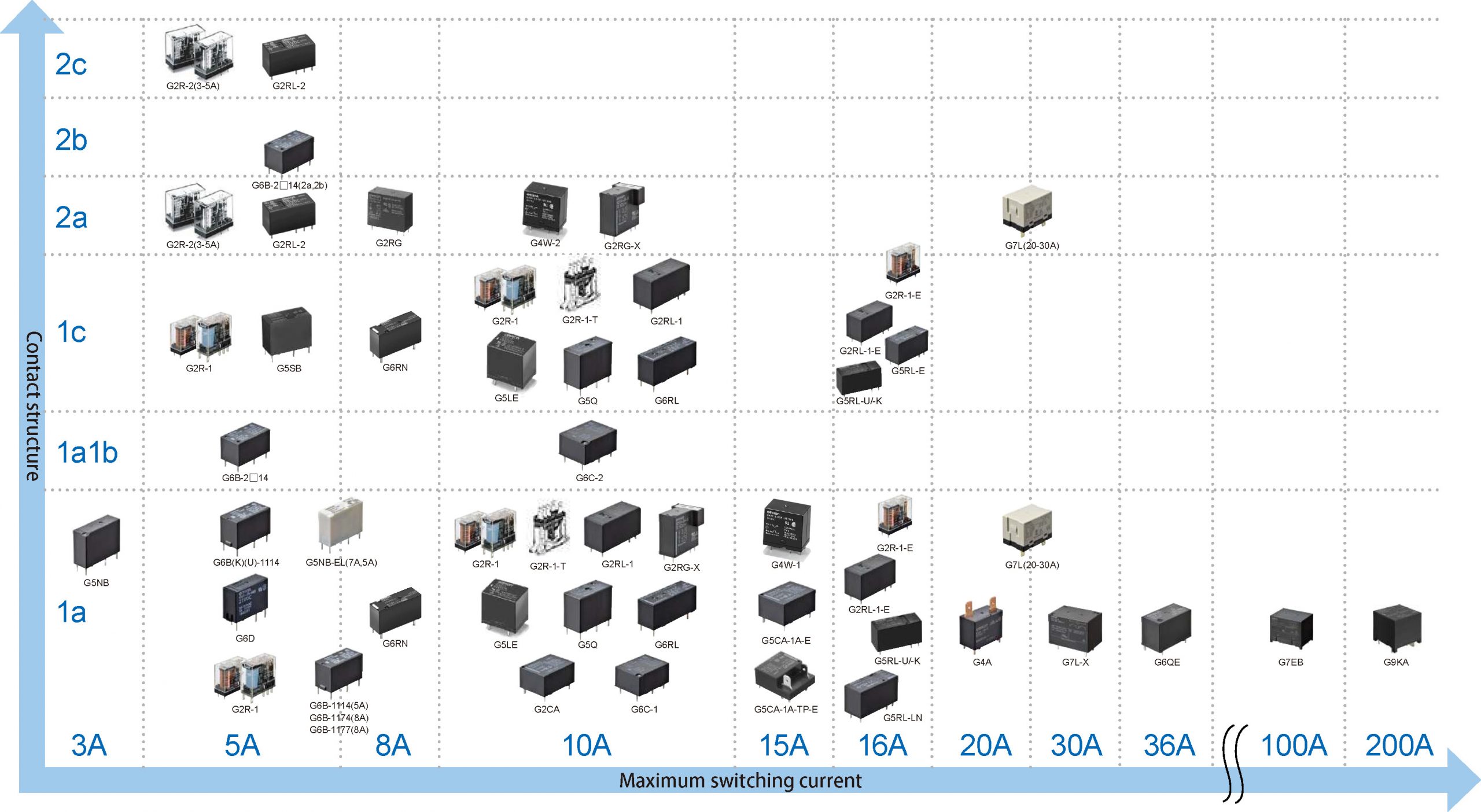
LINE UP

PCB Power Relays
PCB Power Relays for high switching capacity

DC small power relay
DC miniature power relays that enable DC load interruption at 12V and 24V

Power Relays High Capacities Switching
DC power relays that enable DC load interruption at high voltage and current

AC Power Latching Relays
High switching current, AC Application latching relay
Applications:
- Industrial Equipment: Machine Tools, Molders, Welders, Mounters, and other Industrial Robots.
- Household Equipment: Automatic Shutters, Lighting Equipment
- Power Supplies: UPS, Switching Power Supply
- FA Equipment: Programmable Controllers, Temperature Controllers, Timers, and Various I/O Devices
- Electrical Household Appliances: Air conditioners, Washing Machines, Refrigerators
- Energy Market: UPS, PV Inverter, EV Charger, Industrial Air Conditioner
Basic Switches
LINE UP
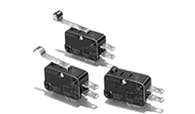
Miniature Basics Switches (V-Size)
Miniature Basic Switches 27.8W×10.3D×15.9H

Subminiature Basic Switches (S-Size)
Subminiature Basic Switches 19.8W×6.4D×10.2H

Ultra Subminiature Basic Switches (J-Size)
Ultra Subminiature Basic Switches 12.8W×5.8D×6.5H

Sealed Basic Switches
Sealed switch against water spray or excessive dust
Applications:
- Automatic Doors and Gates
- Arcade Controllers
- Machine Tools
- Electric Locks
Detection Switches
LINE UP

Detection Switches
General purpose detection switches

Surface Mount Detection Switches
Ultra subminiature SMD detection switches
Applications:
- Electric Locks
- Machine Tools
- Elevator
- Smart Switches for Lighting
- Mouse
- Arcade Controllers
- Transceiver
- Industrial Robots
- Machine Tools
- Temperature Controllers and PLCs
- Gaming controllers
Door Switches/Power Switches
LINE UP
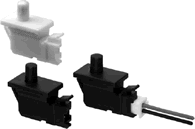
Miniature Door Switches
Switches to detect door open/close

Power/Door Switches
Switches to detect door open/close and to cut the power supply of industrial equipment.
Applications:
- Electric Locks
- Machine Tools
Tactile Switches
LINE UP
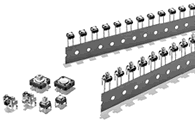
Standard Types
Tactile switches for various operation panel
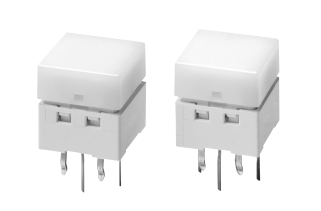
Illuminated Types
Compact construction with bright and uniform illumination

Sealed Types
Dust proof tactile switch by sealed construction

SMD Types
SMD tactile switch suitable for high density mounting
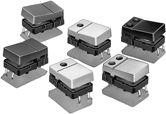
Hinged Types
Hinged design developed through ergonomics
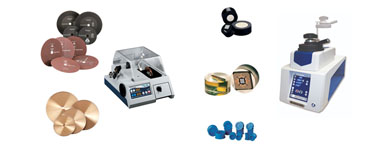
Key tops for Tactile switches
Key tops for B3F, B3W and B3FS
Applications:
- Mouse
- Temperature Controllers and PLCs
Rocker Switches
LINE UP
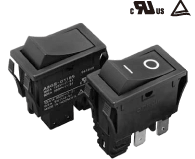
A8GS
Minimum size class in the industry Rocker switch with reset function

A8GS-T
Minimum size class in the industry Remote Reset Rocker Switch with Delay OFF Function

A8L
Miniature Rocker Switch for High Capacity Switching
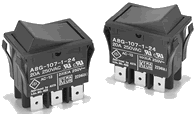
A8G
Rocker Switch with External Reset Function for High capacity Switching

A8A
Safety-considered Power Rocker Switch
Applications:
- Elevator
- Industrial Robots
Pushbutton Switches /Indicators
LINE UP

Small Pushbutton Switches/Small Indicator
Small pushbutton switches and indicators with 8 to 12mm diameter

Pushbutton Hand switches
Pushbutton Hand switch
Applications:
- Industrial Robots
Toggle/Pushbutton Switches
LINE UP
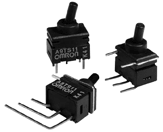
Toggle Switches
Ultra subminiature toggle switches

Pushbutton Switches
Ultra subminiature pushbutton switches
Applications:
- Industrial Robots
Toggle/Pushbutton Switches
LINE UP
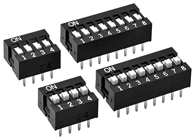
Slide Types
DIP switch for various setting devices

Piano Types
DIP switch with up and down operation
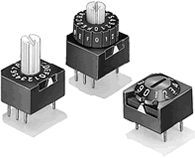
Rotary Types
Rotary DIP switch suitable for channel setting
Applications:
- Commercial Air Conditioning
- Security Devices
- Servo Inverter
- Temperature Controllers and PLCs
Board to Cable Connectors
LINE UP
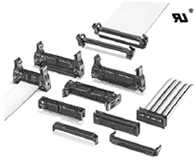
Flat Cable Connectors
The core of a printed circuit board connectors and MIL standard connectors

Crimped MIL Connector Sockets for Discrete Wires
Crimped sockets for discrete wires join the MIL connector series

Easy-wire Connectors for Industrial Components
Easy-wire Connectors with e-CON specifications; Ideal for connecting sensor
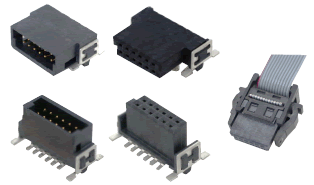
Half-Pitch SMT Connectors
SMT-compatible Connectors with a 1.27-mm Pitch

PCB Terminal Blocks
Terminal block PCB connectors suitable for controller interface.
Applications:
- PV invertor
- Energy storage system
- EV charger
- Robot controller
- Servo controller Stepping controller
- Working machine Forming machine
- Semiconductor manufacturing equipment
- Financial machine
- Home appliances/ small home appliances
- Building/home security devices
Board to Board Connections
LINE UP

DIN Connectors/DIN Style Connectors
Comprehensive product lineup based on the international DIN standard.

Half-Pitch SMT Connectors
Contact pitch of 1.27 mm. Supports increments of 1 mm for stacking heights of 5 to 20 mm.
Applications:
- PV invertor
- Energy storage system
- EV charger
- Robot controller
- Servo controller Stepping controller
- Working machine Forming machine
- Semiconductor manufacturing equipment
- Financial machine
- Home appliances/ small home appliances
- Building/home security devices
FPC/FFC Connectors
LINE UP

XF3M/XF2M
Rotary Backlock Connector (0.5-mm Pitch, 1.0-mm Pitch, Dual sided, Upper sided Contact) Rotary Backlock Connectors Provide Improved Insertion of FPC/FFC Cables and helps Confirm Proper Connection with Sure Lock Feel.
Applications:
- PV invertor
- Energy storage system
- EV charger
- Robot controller
- Servo controller Stepping controller
- Working machine Forming machine
- Semiconductor manufacturing equipment
- Financial machine
- Home appliances/ small home appliances
- Building/home security devices
External Connector
LINE UP

D-Sub Connectors
D-Sub connectors that are ideal for office equipment interfaces

USB Connectors
USB-Compliant Interface Connectors.
Applications:
- PV invertor
- Energy storage system
- EV charger
- Robot controller
- Servo controller Stepping controller
- Working machine Forming machine
- Semiconductor manufacturing equipment
- Financial machine
- Home appliances/ small home appliances
- Building/home security devices
IC Sockets/Jumper Plugs
LINE UP

IC Sockets
IC Connectors have excellent reliability and can tolerate momentary Interruptions in power.

Testing Socket for Devices with USB Type C Connector
Socket for testing electronic devices that have a USB Type-C I/O connect

Jumper Plugs
Low-profile Circuit Jumper Connectors
Applications:
- PV invertor
- Energy storage system
- EV charger
- Robot controller
- Servo controller Stepping controller
- Working machine Forming machine
- Semiconductor manufacturing equipment
- Financial machine
- Home appliances/ small home appliances
- Building/home security devices
Flow Sensors
LINE UP
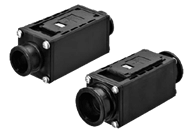
Mems Flow Sensors (Flow Rate Types)
High accuracy and wide range ability. Suitable for various needs of flow measurements.
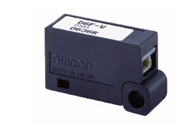
Mems Flow Sensors (Velocity Types)
Save energy with airflow sensing. Optimize air conditioning control without sacrificing quality.
Applications:
- Combustion
- HVAC
- Measurement
- Clogging Detection
Pressure Sensors
LINE UP

MEMS Gauge Pressure Sensors
Subminiature MEMS gauge pressure sensors with low power consumption.
Applications:
- Combustion
- HVAC
- Measurement
- Clogging Detection
Vibration Sensors/Tilt Sensors
LINE UP

Seismic Sensors
The world's smallest class size, high-precision seismic sensor. IoT friendly.

Vibration Sensors/Tilt Sensors
Detecting vibration/fall by an earthquake quickly and making it possible to prevent second disaster.
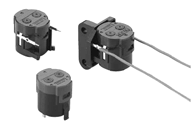
Automatic Horizontal Vibration Sensors
Quickly detect earthquakes to help prevent secondary disasters. Auto-level mechanism enables mounting at ±5°
Applications:
- Industrial (Semiconductors/FPDs, machine tools, control panels, combustion furnaces, printers)
- Residential (Distribution boards, disaster prevention systems, home appliances (heaters, gas stoves))
- Commercial (Electrical/gas meters, chemical plants, highways, bridges, tunnels, railroads)
D6T MEMS Thermal Sensors
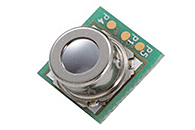
MEMS Non-Contact Thermal Sensor for Contactless Measurement
- Achieves a low NETD*1 through the combination of ASIC and MEMS
- Direct temperature value output allows easy software design
- Variation of the number of elements (1 to 1024) and the temperature range (-40 to 200°C)
Applications:
- Refrigerator Interior & Room Temperature Detection
- Human Presence Detection
- Screening of Humans with Fever
- Abnormal High Temperature Monitoring
Environment Sensors
LINE UP

2JCIE-BL
Sense a variety of environmental information
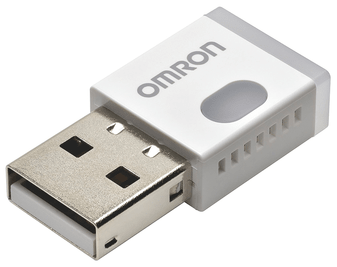
2JCIE-BU
Sense a variety of environmental information
Applications:
Six types of sensing functions
Temperature, humidity, light, barometric pressure, noise, acceleration
Photomicrosensors
LINE UP

Transmissive Types
Transmissive types

Reflective Types
Compact reflective model

Photomicrosensors for FA
Small optical sensors to detect the work
Applications:
- Presence detection (Amusement equipment, Robotic vacuum cleaners, Medication related equipment)
- Position detection (Cash dispensers, 3D printers, Commercial coffee machines)
- Rotation detection (Smart gas meters, Mobile IP cameras, Various dials)
- Rotation and direction detection (Robots, Camera lens mechanisms, Analytical equipment (trackball devices))
Light Convergent Reflective Sensors/Diffuse Reflective Sensors
LINE UP
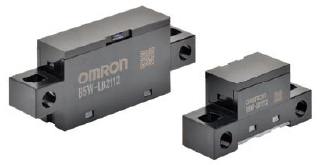
Light Convergent Reflective Sensors
This sensor can detect various targets like transparent, mirror or black works.

Diffuse Reflective Sensors
Miniature long-distance diffuse reflective sensor that can be installed anywhere.
Applications:
- Analysis equipment – Container detection
- Printing equipment – Printed paper detection
- Tablet packagers- Tablet package detection
- Coffee makers – Cup detection
- Delivery boxes – Article detection inside boxes
- Sanitation equipment -Hand detection
B5WC Color Sensor to Build into Equipment

NEW
Reliable Detection of Changes and Differences in Color – Contributes to Automation of Equipment –
- Improves equipment maintenance efficiency by monitoring the changes in liquid color.
- Assists equipment multifunctionality and work automation by an operation based on the color information of the detected object.
- Provides stable operation of equipment by detecting the objects by color.
- Can be built into equipment thanks to its compact form* and high degree of installation flexibility.
Applications:
- Machine tool – Remote monitoring of lubricant color
- Drink dispenser – Automatic supply of beverages according to the cup color
- Object detection on the production line
Displacement Sensors/Ranging Sensors
LINE UP

3D TOF Sensors Module
Real-time 3D sensing of distance to humans or objects
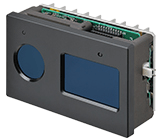
Micro-displacement Sensors
Higher resolution, ultra compact and suitable for paper thickness detection
Applications:
- AMR/ Service robots- Drop detection/ Environment recognition, Periphery recognition/ Human recognition
- Logistics and conveyance- Volume and shape measurement, Empty space detection
- Observation- Behavioral understanding and observation of patients under long-term care
- Automatic doors/elevators- Counting people and tracking traffic flows
Human Detecting Sensors
LINE UP

Human Image Sensors
Image sensing compo with 10 different image sensing functions to recognize people's conditions.
Applications:
- Beverage vending machines, ticket vending machines, POS, signage
- Industrial equipment
- Long-distance detection type
Human Image Solution

Applications:
- Digital camera, Smart phone
(Camera App) - Security
IP camera - Digital signage
- Photo management software
- Vending machine
- Communication robot
W7ED Touch Sensor
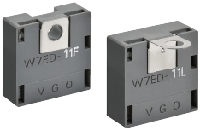
NEW
Reliable operation that requires only a light touch. Models equipped with anti-static FG terminals are also available.
- Suitable for embedding in equipment
- Enables touch sensor configurations to be created that suit your application. Touch electrodes and touch sensor electrodes can be fastened just using screws.
- Body-to-electrode static electricity transfers can easily be prevented using FG terminal models.
- Supports 5 to 15 VDC, with open-collector output.
Applications:
- Lights
- Elevators
- Vending Machines
- Faucets
2JCIE-EV Sensor Evaluation Board
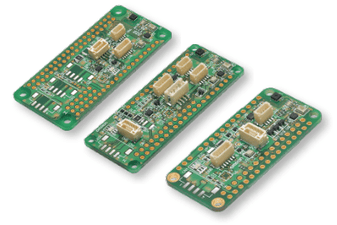
Sensor evaluation board that supports open platform
- Easily implement development of a new IoT system that senses a wide variety of environmental information

OMRON can manufacture the world’s smallest class* testing sockets with a narrow pitch of 0.175mm
Camera and display modules, which are becoming more multifunctional through high-density mounting, are increasingly using narrower pin spacing. It is extremely difficult to inspect extremely small products with dozens of terminals arranged in a narrow pitch. However, the narrow-pitch compatible type, which is packed with OMRON’s technology, can realize highly accurate inspection even for extremely small and narrow-pitch products that require delicate handling.
Let OMRON take care of the inspection of extremely small and multi-terminal electronic components.
*According to our own research in March 2023


|
Item
|
Specification
|
|---|---|
|
Contact force
|
25gf at 0.4mm
|
|
Recommended stroke
|
0.4mm (PCB side: 0.15mm DUT side: 0.25mm)
|
|
Maximum stroke
|
0.5mm (PCB side: 0.15mm DUT side: 0.35mm)
|
|
Contact resistance
|
80mΩ
|
|
Rated current
|
2.0A DC
|
|
Plating
|
Au
|
*Specifications are for reference only and may vary depending on the customized product.
Smartphone camera module

World’s smallest class* with a narrow pitch of 0.175mm
*According to our own research in March 2023
Pogo pins are cylindrical in shape and occupy mounting space, making it difficult to place them side by side at a pitch of 0.35mm or less. Forcibly making the size to be smaller will make it less durable, and the pin will break immediately. However, OMRON’s blade pins, which are formed by depositing metal onto a mold plate using the EFC process technology, are plate-shaped, so they can be arranged at a minimum pitch of 0.175mm. OMRON’s testing sockets meet the narrow pitch needs of inspection products which are becoming increasingly multifunctional due to high-density mounting.


OMRON’s blade pin
Plate shape enables narrower pitches.
Minimum pitch width of 0.175mm
Pogo pin
Cylindrical shape makes it difficult to narrow the pitch compared to plate-shaped blade pins.
Minimum pitch width of 0.35mm

High frequency is one of the most important technologies in the mobile communication field. Electronic equipment all around us such as wireless LANs, cellular phones, and GPS are full of high-frequency circuits. Naturally, the equipment used to inspect them is also required to have excellent high-frequency characteristics. OMRON’s high frequency compatible sockets can handle up to 43.5GHz frequency band.
We propose a path length that has sufficient stroke length.

|
Item
|
Specification
|
|---|---|
|
Pitch
|
0.175/0.3/0.35/0.4/0.5mm or more
|
|
Stroke
|
0.2mm or more
|
|
Contact resistance
|
100mΩ or less
|
|
RF
|
50GHz or less
|
|
Plating
|
Au
|
*Specifications are for reference only and may vary depending on the customized product.
World’s smallest class* with a narrow pitch of 0.175mm
*According to our own research in March 2023
OMRON’s high-frequency compatible sockets can handle up to 43.5GHz frequency band. The key to enhancing high-frequency characteristics is to eliminate contact resistance as much as possible. Since general pogo pins are composed of multiple parts, they tend to have high internal resistance and poor high-frequency characteristics. However, OMRON’s high-frequency pins can be manufactured in a single component using a processing method unique to the EFC process technology. Excellent high-frequency characteristics can be achieved because there is no contact resistance between the contacting parts of the components.


High durability and reduced maintenance
Custom design recommendations that best suit the customer’s application and OMRON’s original material blend* make our sockets more than five times more durable than pogo-pin sockets. This greatly reduces the frequency of testing socket replacement at the inspection site, contributing to improved production efficiency.
*Patent No. 5077479



The need for high-capacity equipment is steadily increasing, and the equipment that inspects the equipment is also required to handle high capacities. OMRON’s high-current compatible sockets have a long mechanical durability of 500,000 times or more and can handle high currents of 2.5A DC or higher. A wide range of variations are available to expand the scope of customer inspections.

|
Item
|
Specification
|
|---|---|
|
Pitch
|
0.175/0.3/0.35/0.4/0.5mm or more
|
|
Stroke
|
0.5mm or more
|
|
Contact resistance
|
50mΩ or less
|
|
RF
|
2.5A DC or more
|
|
Plating
|
Au
|
*Specifications are for reference only and may vary depending on the customized product.
Bundle structure can handle up to 10A DC
OMRON’s high-current type can handle up to 2.5A DC using a single pin, and up to 10A DC by adopting a bundle structure with multiple pins connected. It can be used for inspection of power semiconductors such as QFN (quad flat non-leaded) packages.
In order to achieve a large current while ensuring sufficient spring property, the high-current type uses a multiple-spring structure where multiple springs are connected using a manufacturing method unique to the EFC process technology. Larger and thicker pins can handle larger current, but this will result in poor spring property, leading to reduced contact accuracy and durability. The multiple-spring structure provides the same conduction area as a single-spring, and the design of providing space allows for flexible movement inside the pin while accommodating large currents.



Handling ultra-high current range under low duty ratio (actual value)
OMRON conducts duty ratio tests on high current sockets to evaluate their performance. OMRON’s high-current type has the ability to handle even larger currents under a low duty ratio (when the current flow time is short). Semiconductor testing is only used to check for continuity and is not used in such a way that a large current is applied for a long period of time. Under low duty ratio, OMRON’s high-current type can also be used to inspect power semiconductors with specifications of several tens of amperes, which is considered to be in the ultra-high current range in the semiconductor industry. Please consider adopting OMRON’s high-current type.

Kelvin connection compatible
High-density terminal arrangement with minimized insulation distance to
handle large currents
There are probably many customers who use Kelvin connection measurement (four-terminal measurement) for the inspection of power semiconductor products that handle large currents. The larger the current, the higher the contact resistance, and the more difficult it is to accurately measure the specifications of the device under test. The Kelvin connection separates the terminals for current measurement from those for voltage measurement, allowing accurate measurement of the resistance of the device under test without being affected by lead resistance or contact resistance.

Since Kelvin measurement requires that the current-measuring pin and the voltage-measuring pin are in contact with the same terminal, it is important that both pins are properly insulated to ensure safe use. OMRON’s high-current compatible type also offers sockets with pins equipped with insulating films.
In general, as the number of pins available for measurement increases, it becomes possible for larger currents to be measured and inspected. Pogo pins are cubic in shape, so they require more mounting space than plate-shaped pins. This makes it difficult to press multiple pins against a very small terminal (electrode pad) for inspection.
In addition, the isolation distance must be secured to allow larger currents to flow. Therefore, with typical Kelvin compatible sockets, the challenge is how to apply multiple pins to a high-current, small-package device under test.
OMRON’s high temperature compatible type blade pins are plate-shaped and very slim. Since more test pins can be applied to one terminal (electrode pad), it is possible to handle larger currents than with common Kelvin compatible sockets. Furthermore, the blade pins have an insulating film, which allows space-saving design without taking up a large insulating space, even when used at high currents.


Conventional Kelvin compatible sockets require the current and voltage pins to be placed separately in some cases affects the design of the device under test and measurement equipment, such as the layout of terminals. However, OMRON’s Kelvin compatible sockets allow the current and voltage pins to be placed separately within the same bundle by simply flipping the pins. This can contribute to a reduction in the customer’s design and manufacturing man-hours

The pins for measuring current and voltage can be easily separated by simply flipping the terminals, making design and production easier.

Pins for measuring current and voltage are mixed, making design and production difficult.
High durability and reduced maintenance
Custom design recommendations that best suit the customer’s application and OMRON’s original material blend* make our sockets more than five times more durable than pogo-pin sockets. This greatly reduces the frequency of testing socket replacement at the inspection site, contributing to improved production efficiency.



Electronic devices such as MLCCs, crystal oscillators, and surface acoustic wave filters are very small, some about 1/10th the size of a grain of rice. When inspection pins were applied to these products, it was difficult to perform highly accurate continuity inspections because the tip of each testing pin was extremely thin, resulting in variations in measurement values. To make matters worse, the terminals of the device under test are often made of ceramic and are very hard, so the tips of the testing pins were scraped. This resulted in a short life span and increased maintenance frequency, thereby reducing production efficiency. There was also a problem that the broken pin could damage the device under test itself.
OMRON’s high hardness compatible sockets can be used safely for such extremely small package products.


|
Item
|
Specification
|
|---|---|
|
Contact force
|
20gf at 0.95mm
|
|
Recommended stroke
|
0.95mm (PCB side: 0.15mm, DUT side: 0.8mm)
|
|
Maximum stroke
|
1.35mm (PCB side: 0.15mm, DUT side: 1.2mm)
|
|
Minimum stroke
|
0.55mm (PCB side: 0.15mm, DUT side: 0.4mm)
|
|
Contact resistance
|
130mΩ
|
|
Rated current
|
DC 1.0 A
|
|
Plating
|
Au
|
*Specifications are for reference only and may vary depending on the customized product.
Stable contact for accurate inspections
OMRON’s ultra-small package compatible sockets have a convex tip shape to ensure a sufficient contact area with the conduction pad. The strength of the EFC process technology is its ability to control the dimensional tolerances of this tip shape in micron order with extremely small pins and even in mass production.

In addition, the material of the terminals (electrode pads) of small devices under test such as crystal oscillators is often ceramic, and the surface is uneven. Therefore, there are cases where it is difficult to accurately measure the movement of vertical pins such as pogo pins. However, due to the movement of the spring that is unique to the EFC process technology, OMRON’s blade pins make contact in such a way that the pin rubs the terminal surface rather than making contact in a vertical direction. This makes it possible to offer products with reliable contact and stable measurement accuracy.

Omron’s probe pin (blade pin) movement for reliable contact

Long operating life and reduced maintenance
The convex tip shape greatly reduces damage to the pin tip. OMRON’s blade pins reduce maintenance man-hours in the mass production process and contribute to increased production efficiency.
Furthermore, the blade pins greatly reduce the risk of damaging the customer’s product due to breakage of the tip, enabling stress-free inspections.

Custom design recommendations that best suit the customer’s application and OMRON’s original material blend* make our sockets more than five times more durable than pogo-pin sockets. This greatly reduces the frequency of testing socket replacement at the inspection site, contributing to improved production efficiency.
*Patent No. 5077479



High measurement accuracy is achieved even for small sized SOP (small outline package) without damaging the device under test.

|
Item
|
Specification
|
|---|---|
|
Pitch
|
1.27/0.65mm or less
|
|
Stroke
|
0.5mm or more
|
|
Plating
|
Au
|
*Specifications are for reference only and may vary depending on the customized product.
No damage to customer’s products
When measuring small devices under test, such as SOPs, frame deformation caused by the contact of testing pins is a challenge due to the fragility of the lead frame. OMRON’s SOP compatible sockets use blade pins that are structured to clamp the lead frame of the device under test from both sides.
Stress is hard to be applied, preventing deformation and damage of the lead frame during inspection.

Gently clamp the lead frame of the device under test from both sides with blade pins to prevent deformation and damage to the lead frame.

The lead frame is deformed because the rod-shaped hard testing pin is pressed against the fragile lead frame.
Accurate measurements even in a small package
In the case of small and wobbly devices under test, such as an SOP package, it is difficult to accurately inspect each terminal by pressing a rod-shaped pogo pin against the terminal. OMRON’s SOP compatible type contacts the lead frame in such a way as to clamp it from both sides, enabling the testing pin to be pressed with accurate and sufficient contact force even for an SOP sized device under test. The SOP compatible type provides stable electrical contact and highly accurate measurements.

Stable contact is achieved by clamping the lead frame of the device under test from both sides with blade pins.

The terminal on the inspection side is rod-shaped and makes point contact, so it is difficult to accurately bring into contact the terminal to the lead frame of the small and wobbly device under test.
High durability and reduced maintenance
OMRON’s SOP-compatible sockets are five times more durable than pogo-pin sockets, due to OMRON’s original material blend* and custom design proposals that are suitable for customers’ applications. This greatly reduces the frequency of testing socket replacement at the inspection site, contributing to improved production efficiency.
*Patent No. 5077479



OMRON offers socket types that can be used in high temperature environments up to 200°C. The socket types can be used safely for a long period of time in burn-in tests, etc., where initial failures are eliminated in advance by applying temperature and voltage loads. Furthermore, with the same size design as pogo pins, it is possible to replace currently used pogo pins.

|
Item
|
Specification
|
|---|---|
|
Contact force
|
20gf at 1.0mm
|
|
Recommended stroke
|
1.0mm
|
|
Maximum stroke
|
1.4mm
|
|
Contact resistance
|
100mΩ
|
|
Rated current
|
1A
|
|
Ambient temperature
|
-40~200℃
|
|
Plating
|
Au
|
*Specifications are for reference only and may vary depending on the customized product.
Usable in high temperature environments up to 200°C
Pogo pins generally have a spring inside. Therefore, when used at high temperatures, depending on the combination of materials, the inner spring and outer housing may be welded together. However, OMRON’s high temperature compatible type testing pins have a structure that is resistant to welding by placing a spring made of heat-resistant material outside of the pin. The high temperature compatible type has a contact resistance of 100mΩ or less even after 500,000 operations at a high temperature of 180°C. Accurate inspections can be performed even in high temperature environments without being affected by contact resistance or mechanical life.


Safe inspection with stable contact
Pogo pins are basically composed of plunger, spring, and barrel designs, and conduction occurs when the plunger and spring come into contact with each other. Therefore, contactability is dependent on the movement of the spring. OMRON’s high temperature compatible type conducts electricity when the upper plunger and the lower plunger come into contact with each other. The contact structure is such that the lower plunger clamps the upper plunger from both sides, ensuring sufficient contact force. The stable contact ensures accurate inspections without being affected by variations in contact resistance.

The contact structure where the upper plunger sandwiches the lower plunger from both sides ensures stable contact.

The contact is unstable because it depends on the movement of the spring in a structure which conducts electricity when the spring and plunger come into contact with each other.
High durability and reduced maintenance
OMRON’s SOP-compatible sockets are five times more durable than pogo-pin sockets, due to OMRON’s original material blend* and custom design proposals that are suitable for customers’ applications. This greatly reduces the frequency of testing socket replacement at the inspection site, contributing to improved production efficiency.
*Patent No. 5077479




